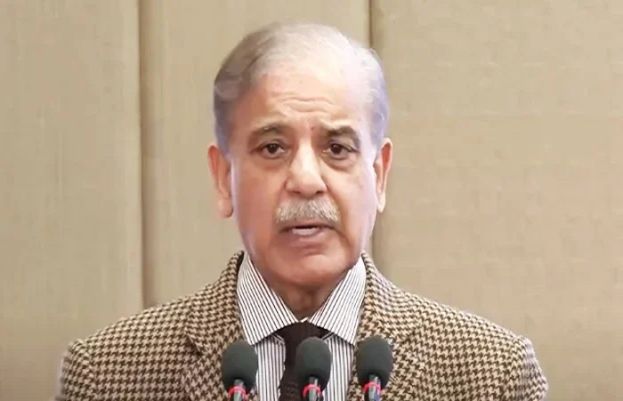Prime Minister Shehbaz Sharif said Pakistan’s economy is stabilising at the micro level, with inflation declining and interest rates reduced, while praising overseas Pakistanis for their continued support. He spoke to the media on Saturday after delivering a landmark speech at the UN General Assembly in New York. “Just a few years ago, the country faced serious economic challenges,” he said. “When we assumed office, inflation was 32% and the policy rate 22.5%. In just one and a half years, inflation has fallen to single digits, and the policy rate is down to 11%. At the micro level, the economy is now stable.” The prime minister described overseas Pakistanis as “great ambassadors,” noting that they sent $38.5 billion in remittances during the fiscal year 2024-25. “Their support has been crucial for Pakistan’s economic stability,” he added. Discussing his international visits, Shehbaz Sharif called his reception in Saudi Arabia “unprecedented in the last 40 years” and described his meeting with US President Donald Trump as “very encouraging.” “The US is ready to invest in Pakistan’s trade, IT, and other sectors,” he said. “During the meeting, we discussed the economy, counter-terrorism, minerals, artificial intelligence, IT, and cryptocurrency. I also thanked President Trump on tariff issues, while minerals pricing and trade agreements between Pakistan and the US will be settled fairly and in mutual interest.” The prime minister also reflected on Pakistan’s military achievements. “From May 6 to 10, our armed forces bravely defeated India in the conflict. We shot down seven enemy planes and carried out strikes at Delhi, Pathankot, and other locations,” he said, crediting Chief of Army Staff Field Marshal Syed Asim Munir for his leadership. He added, “The Field Marshal guided our forces wisely. On May 10, the US Secretary of State Marco Rubio spoke with him, and India communicated their desire for a ceasefire. We had already achieved victory and accepted the ceasefire to prevent further escalation.” Recalling the change in India’s attitude, he added, “Those who once never spoke properly to you are now embracing you, which shows the strength and courage of our armed forces and the victory we achieved.” PM discusses IWT, floods with UN’s Guterres Earlier, PM Shehbaz met UN Secretary-General António Guterres in New York. He told the UN chief that the world body needs to step up and play a stronger role in tackling global problems. The prime minister praised Guterres for his work in promoting peace and stability worldwide. He also thanked the UN for acknowledging Pakistan’s flood relief efforts. “Thousands of people were affected,” he said, “and the UN’s recognition really matters.” Shehbaz stressed that countries hit hardest by climate change need extra support. He also raised the Kashmir issue, noting India’s decision to keep the 65-year-old Indus Waters Treaty (IWT) in abeyance, and urged the UN to ensure fair action. Turning to Gaza, the prime minister called for an immediate ceasefire. He said aid must reach people fast, and a Palestinian state should be established. “Pakistan will continue to work for peace,” he added. “As a Security Council member, we have to do our part.” Guterres responded by appreciating Pakistan’s consistent efforts at the UN. He noted that the country has played a practical role, helping maintain dialogue and stability on global issues. Pakistan means peace, PM tells UNGA In his landmark address, Shehbaz told the United Nations General Assembly (UNGA) that Pakistan sought peace in the region after it delivered a “bloody nose” to India in the May conflict. “We have won the war, and now we seek to win peace in our part of the world, and this is my most sincere and serious offer before this assembly of the world nations,” the prime minister said at the August forum in New York. Pakistan and India engaged in a four-day fight their worst in decades after New Delhi’s unprovoked assault on Islamabad following a terrorist attack in Indian Illegally Occupied Jammu and Kashmir. India blames Pakistan for the attack, a charge that Islamabad has vehemently denied. “Last year, from this very podium, I had warned that Pakistan would act and act most decisively against any external aggression. Those words of mine proved true. I hoped they would not. But then, that is destiny,” the prime minister stressed. In May this year, he recalled, “My country confronted unprovoked aggression from our eastern front. The enemy came shrouded in arrogance; we sent them back in humiliation, delivering a bloody nose”. “India sought to extract political gains from a human tragedy by spurning my sincere offer of an independent international investigation into the Pahalgam incident,” he said. Shehbaz leaves for London via Geneva After completing his visit to the US, PM Shehbaz left New York for London via Geneva. Sources said the prime minister will stop in Geneva to visit former prime minister Nawaz Sharif. He will also brief the Pakistan Muslim League-Nawaz leadership on his US trip. Shehbaz is expected to reach London on Saturday, where he will stay for three days, sources added.
Economy stabilising at micro level, PM Shehbaz calls meeting with Trump ‘positive’

